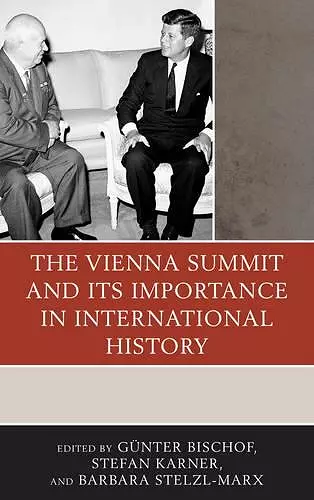The Vienna Summit and Its Importance in International History
Stefan Karner editor Barbara Stelzl-Marx editor Gunter Bischof editor
Format:Hardback
Publisher:Lexington Books
Published:19th Dec '13
Currently unavailable, and unfortunately no date known when it will be back
This hardback is available in another edition too:
- Paperback£64.00(9781498524865)

At the beginning of June 1961, the tensions of the Cold War were supposed to abate as both sides sought a resolution. The two most important men in the world, John F. Kennedy and Nikita Khrushchev, met for a summit in Vienna. Yet the high hopes were disappointed. Within months the Cold War had become very hot: Khrushchev built the Berlin Wall and a year later he sent missiles to Cuba to threaten the United States directly. Despite the fact that the Vienna Summit yielded barely any tangible results, it did lead to some very important developments. The superpowers came to see for the first time that there was only one way to escape from the atomic hell of their respective arsenals: dialogue. The "peace through fear" and the "hotline" between Washington and Moscow prevented an atomic confrontation. Austria successfully demonstrated its new role as neutral state and host when Vienna became a meeting place in the Cold War. In The Vienna Summit and Its Importance in International History international experts use new Russian and Western sources to analyze what really happened during this critical time and why the parties had a close shave with catastrophe.
Based on Russian and US archives and the multinational research efforts of the Ludwig Boltzmann Institute for the Study of the Consequences of War in Graz, Austria, in conjunction with the Contemporary History Archives (RGANI) in Moscow and the Institute of Contemporary History in Munich-Berlin, this book represents a definitive study of the bilateral Vienna Summit meeting of Nikita Khrushchev and John F. Kennedy. The authors of the various articles are top scholars and, in the case of Ted Sorensen and Viktor Sukhodrev, participants in the summit. This valuable contribution to the history of the Vienna Summit's place in international history and in the history of the Cold War offers fresh assessments of Kennedy, Khrushchev, and the Kremlin's decision-making process. It shows, too, that the US had accepted the Soviet sphere of influence in Eastern Europe. The book is rich in documents and should be in every research library. Includes a useful introduction, index, and bibliography. Summing Up: Essential. All academic levels/libraries. * CHOICE *
John Kennedy’s meeting with Nikita Khrushchev in Vienna in early June 1961 spawned a running controversy among political observers and scholars. Did Kennedy encourage Khrushchev’s attempts to take control of West Berlin by appearing weak? Or, did Khrushchev misread Kennedy’s resolve and overplay his hand, leading to the construction of the Berlin Wall (which Khrushchev earlier did not want) and his subsequent humiliation during the Cuban Missile Crisis? This volume provides both key documents and informed commentary that should resolve these controversies. It turns out that the truth is more complicated than the simplistic interpretations that were long current. This collection will be an essential reference for scholars of international relations, of European history, and of the diplomacy of the Cold War. -- Jack F. Matlock, Jr., U.S. Ambassador to the USSR, 1987–1991, Author of Reagan and Gorbachev: How the Cold War Ended
- Winner of Choice Outstanding Academic Titles 2014
ISBN: 9780739185568
Dimensions: 237mm x 160mm x 37mm
Weight: 998g
540 pages